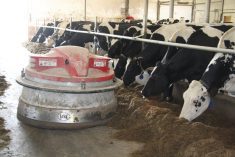PRINCE GEORGE, B.C.- When the American border opens to live cattle, a court challenge to stop trade is expected to follow soon after, says the president of the Canadian Cattlemen’s Association.
The Montana-based group R-CALF is the most likely challenger when the United States Department of Agriculture lays out rules for resumption of live trade.
“They have made it well known they will challenge it,” said Stan Eby in an interview at the British Columbia Cattlemen’s Association meeting.
The group already successfully halted imports of Canadian bone-in meat at the end of April through a court injunction stating the USDA should have received public comments prior to making the decision to expand the list of products.
Read Also

Manitoba extends Crown land rent freeze
Manitoba government links the continued rental rate freeze on grazing and forage leases to economic and environmental challenges facing the industry
Canadian officials are looking for legal recourse if the issue ends up in the courts, including an examination of the North American Free Trade Agreement.
The Ranchers Cattlemen’s Legal Fund-United Stockgrowers of America formed in the mid 1990s to challenge what some American producers perceive as unfair trade practices.
Canada does not want the BSE question to devolve into a political battle. Instead, the government and the cattlemen’s organization prefer to use scientific evidence from the World Health Organization that the disease presents minuscule risk to human health.
While Canada gears up for possible roadblocks, about 40 USDA staff are examining more than 3,500 comments received on changing the rules to readmit Canadian livestock after a single case of BSE halted trade a year ago.
The department of justice is also involved in the rule making process to ensure it passes legal muster, said Eby.
“They’re trying to minimize the potential for challenge,” he said.
American legislation states it does not accept beef or live cattle from any country with BSE. A new rule would allow trade to resume when a country like Canada is deemed at minimum risk of the disease. Eby and other Canadian representatives returned from a trip to Washington after meeting with high level officials to plead Canada’s case.
The supporters include groups like the American Meat Institute, grocers’ organizations and the National Cattlemen’s Beef Association. Eby said most meetings were positive but no one is willing to offer a date for renewed trade.
Many in Canada anticipate a staged opening and want to make sure when the announcement comes, exporters and importers have all necessary paperwork ready so movement is not impeded.















